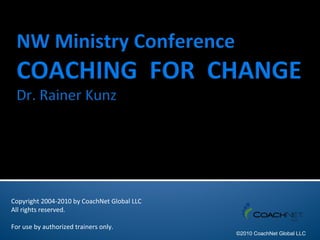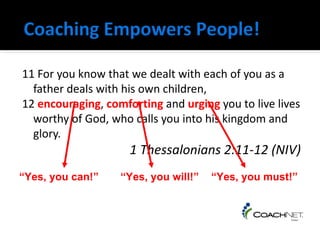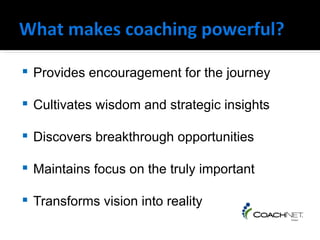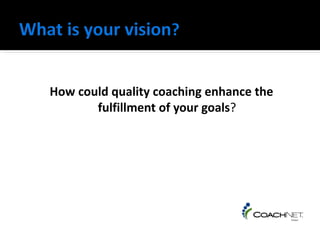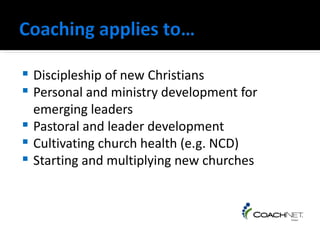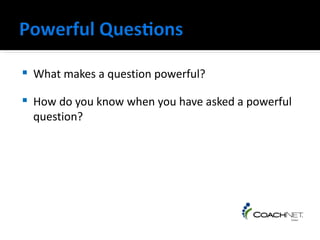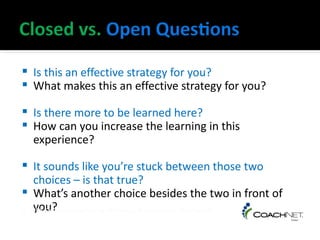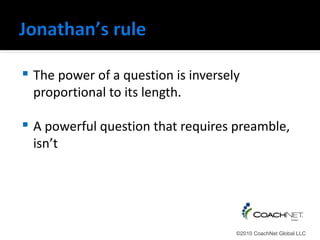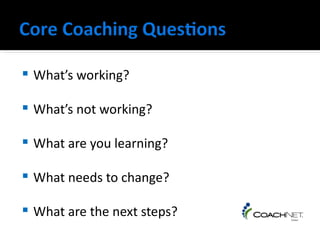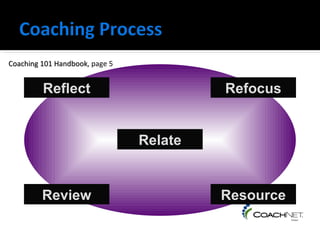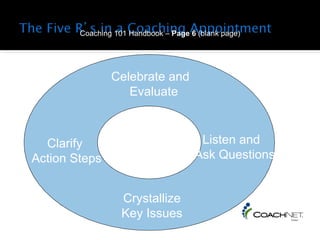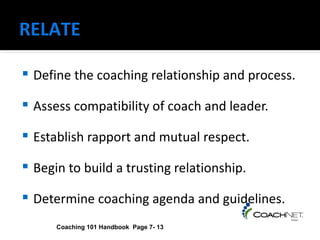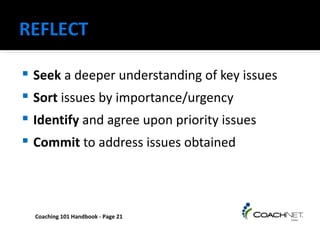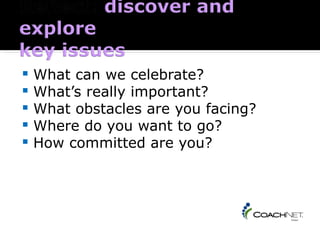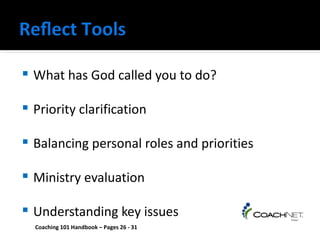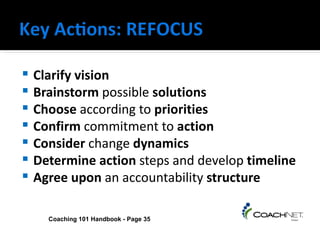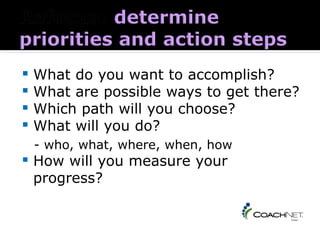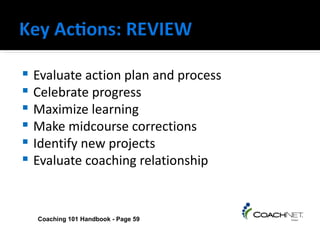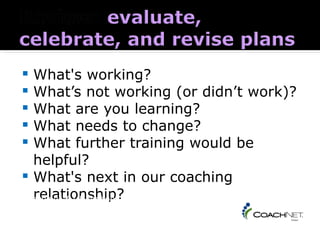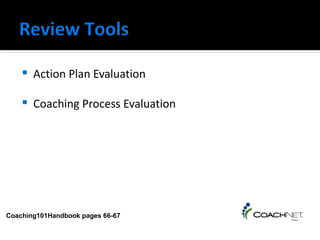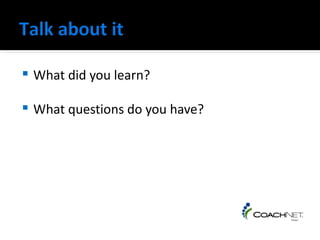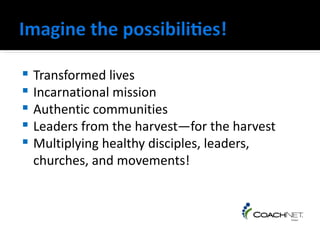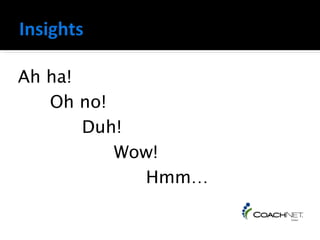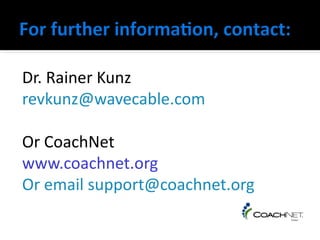Coaching for Change--Rainer Kunz at the Northwest MInistry Conference
- 1. Copyright 2004-2010 by CoachNet Global LLC All rights reserved. For use by authorized trainers only. ©2010 CoachNet Global LLC
- 2. … find out what God wants you to do—and do it! Ephesians 2:10
- 3. 11 For you know that we dealt with each of you as a father deals with his own children, 12 encouraging, comforting and urging you to live lives worthy of God, who calls you into his kingdom and glory. 1 Thessalonians 2:11-12 (NIV) “Yes, you can!” “Yes, you will!” “Yes, you must!” From Dennis Easter used by permission
- 4. The process of coming alongside a person or team to help them discover God’s agenda for their life and ministry, and then cooperating with the Holy Spirit to see that agenda become reality. Coaching is not counseling… Coaching is not consulting… Coaching is not mentoring…
- 5. Provides encouragement for the journey Cultivates wisdom and strategic insights Discovers breakthrough opportunities Maintains focus on the truly important Transforms vision into reality
- 6. Vision Reality
- 7. How could quality coaching enhance the fulfillment of your goals?
- 8. Discipleship of new Christians Personal and ministry development for emerging leaders Pastoral and leader development Cultivating church health (e.g. NCD) Starting and multiplying new churches
- 9. What makes a question powerful? How do you know when you have asked a powerful question?
- 10. Is this an effective strategy for you? What makes this an effective strategy for you? Is there more to be learned here? How can you increase the learning in this experience? It sounds like you’re stuck between those two choices – is that true? What’s another choice besides the two in front of you? © 1998 Co-Active Coaching by Whitworth, Kimsey-House, and Sandahl
- 11. The power of a question is inversely proportional to its length. A powerful question that requires preamble, isn’t ©2010 CoachNet Global LLC
- 12. What’s working? What’s not working? What are you learning? What needs to change? What are the next steps?
- 14. Summarize periodically Without interpreting Without evaluating Invite to say more “What else?” “Tell me more” Unpack fully before giving input
- 15. Coaching 101 Handbook, page 5 Handbook Reflect Refocus Relate Review Resource
- 16. Coaching 101 Handbook – Page 6 (blank page) Celebrate and Evaluate Clarify Listen and Action Steps Ask Questions Crystallize Key Issues
- 17. Define the coaching relationship and process. Assess compatibility of coach and leader. Establish rapport and mutual respect. Begin to build a trusting relationship. Determine coaching agenda and guidelines. Coaching 101 Handbook Page 7- 13
- 18. How are you doing? Where are you now? How can I be praying for you? What do you want to address? How can we work together? Coaching 101 Handbook - page 5
- 19. Seek a deeper understanding of key issues Sort issues by importance/urgency Identify and agree upon priority issues Commit to address issues obtained Coaching 101 Handbook - Page 21
- 20. What can we celebrate? What’s really important? What obstacles are you facing? Where do you want to go? How committed are you? Coaching 101 Handbook page 5
- 21. What has God called you to do? Priority clarification Balancing personal roles and priorities Ministry evaluation Understanding key issues Coaching 101 Handbook – Pages 26 - 31
- 22. Clarify vision Brainstorm possible solutions Choose according to priorities Confirm commitment to action Consider change dynamics Determine action steps and develop timeline Agree upon an accountability structure Coaching 101 Handbook - Page 35
- 23. What do you want to accomplish? What are possible ways to get there? Which path will you choose? What will you do? - who, what, where, when, how How will you measure your progress? Coaching 101 Handbook - page 5
- 24. Sharpening Your Vision Action Planner Change Guide Coaching 101 Handbook Pages 42-45
- 25. Assess existing resources Focus first on what you already have instead of what you don’t have! Brainstorm all resource needs Identify new resource(s) to accomplish goals Determine where and how to find new resources Clarify and confirm the role of coach Coaching 101 Handbook - Page 49
- 26. What resources do you already have? What resources will you need to accomplish your goals? What resources are missing? Where can you find additional resources? What can I do to support you? Coaching 101 Handbook - page 5
- 27. Evaluate action plan and process Celebrate progress Maximize learning Make midcourse corrections Identify new projects Evaluate coaching relationship Coaching 101 Handbook - Page 59
- 28. What's working? What’s not working (or didn’t work)? What are you learning? What needs to change? What further training would be helpful? What's next in our coaching relationship? Coaching 101 Handbook - page 5
- 29. Action Plan Evaluation Coaching Process Evaluation Coaching101Handbook pages 66-67
- 30. What is the coach doing? How is the person being coached responding? Jot down your observations.
- 31. Think about something in your ministry that you want to improve Get in groups of three Coach; observer; person to be coached Coach for 15 min – 5 min feedback What’s working? What’s not working? What needs to change? What are your next steps?
- 32. What did you learn? What questions do you have?
- 33. One-to-one coaching relationships Where special attention is needed Helpful for emerging leaders Coaching clusters (4-7 leaders) Requires group dynamic leadership Time intensive for individual focus Coaching triads (3 leaders) Increased care and attention Peer-to-peer maximized
- 34. Who do I want to invest in? How can I prioritize coaching in my schedule? What will I stop doing to free up time and energy to focus?
- 35. Transformed lives Incarnational mission Authentic communities Leaders from the harvest—for the harvest Multiplying healthy disciples, leaders, churches, and movements!
- 36. Meet with Rainer for a free personal coaching session (revkunz@wavecable.com or call 360.362.3698.) Work with a coach for greater traction Learn more about coaching Become a certified coach
- 37. Train staff or lay leaders in coaching Get a coach to help your congregation or staff through a health assessment Develop a coaching movement to accomplish broader organizational goals
- 38. Ah ha! Oh no! Duh! Wow! Hmm…
- 39. University Place, WA/9:30am & 7:30 pm on Wednesday April 18, 2012 Now is the time to plan to grow your skills! CoachNet's Intro to Coaching events provide an overview of the available training options--whether it's Standard Coach Training, Advanced Coach Training, or coaching for discipleship--you can design a process for building your personal training plan, and a forum to answer your questions about CoachNet, coaching, and coach training.
- 40. Dr. Rainer Kunz revkunz@wavecable.com Or CoachNet www.coachnet.org Or email support@coachnet.org
Editor's Notes
- 04/02/12 This is Bob ’s Father’s definition of success- Find out what God wants you to do and do it… Eph 2:10 follows- for we are saved by grace so that…. ”we can do the good things God has planned for us, long ago.” Coaching is the key component to empower others and cultivate fruitfulness. The goal of coaching is to help others find out what God wants them to do and to do it.
- 04/02/12 1 Thessalonians articulates a vision to empower others. The specifics of this vision are embodied in the three participles- Coaching is all about encouraging, comforting and urging. Who came along side you – to remind you “yes you can!” (maybe think of a coach…mentor) Encouragers say “yes, you can!”, those who bring comfort also provide hope, and then those who urge you on remind you of the call, the urgency and the destination. (A Biblical example of this is David when he was in the cave- in this dark and lonely place he found hope and encouragement knowing God is true to his promises)
- 04/02/12 For clarification… Counseling is about self understanding, healing, and wholeness. Consultants assume the role of an expert, someone who is hired to diagnose and prescribe action plans Consulting can be prophetic- speaking truth with follow-up coaching. Mentoring necessitates that someone has something to teach or pass on connected to a specific skill set. A Mentor is someone who had gone before and pours in, a coach goes alongside and draws out.
- Cultivates Wisdom- Every coach needs a coach- we need someone asking us powerful questions Focus on the important- how do we keep focus on the truly important?
- 04/02/12
- 04/02/12 Coaching a new disciple is discipleship Bob tells the story of conversion and disciple-making in Honduras. When believers go to convert a village, after they receive Christ they are baptized…then immediately following, they look at Romans 6- you died with Christ, were raised with Him… and then they ask- “what sinful habit do you have in your life that you need the power of the Holy Spirit to change?” This is essentially coaching, with an action plan and scripture. Second question- Acts 1 “how do you know what needs the transforming power of Christ in their life?” They work on ministry and character development from day 1. This process is built on the belief that the new Christian has just as much of the presence/guidance of the Holy Spirit as they do. You can insert you own slides here for your specific vision- or a slide that details what ’s next specifically for your group. Give them time to think about what there vision is and then share with a neighbor. The goal is for participants to grasp the vision- buy into the process and articulate how this process will benefit them Give some final examples- what if… For those of you in family ministry- if parents had coaching skills and were able to interact with their kids as a coach For church multiplication, if every church plant team had a coach and could integrate coaching systems into the plant? For leadership development… Coaching can impact all these areas and more. As a trainer share a story of how you have seen the impact of coaching
- 04/02/12 Coaching a new disciple is discipleship Bob tells the story of conversion and disciple-making in Honduras. When believers go to convert a village, after they receive Christ they are baptized…then immediately following, they look at Romans 6- you died with Christ, were raised with Him… and then they ask- “what sinful habit do you have in your life that you need the power of the Holy Spirit to change?” This is essentially coaching, with an action plan and scripture. Second question- Acts 1 “how do you know what needs the transforming power of Christ in their life?” They work on ministry and character development from day 1. This process is built on the belief that the new Christian has just as much of the presence/guidance of the Holy Spirit as they do. You can insert you own slides here for your specific vision- or a slide that details what ’s next specifically for your group. Give them time to think about what there vision is and then share with a neighbor. The goal is for participants to grasp the vision- buy into the process and articulate how this process will benefit them Give some final examples- what if… For those of you in family ministry- if parents had coaching skills and were able to interact with their kids as a coach For church multiplication, if every church plant team had a coach and could integrate coaching systems into the plant? For leadership development… Coaching can impact all these areas and more. As a trainer share a story of how you have seen the impact of coaching
- 04/02/12 Ask for group feedback on this. The Power of a question is dependent on the receptor – the person will tell you if it is a good question. Often when you have asked a powerful question there will be silence- because they ’re thinking. When the coachee is silent don ’t say a thing, give them space to think about their response.
- 04/02/12 One challenge we face in coaching is to learn how to ask open ended questions. From an early age we are exposed to closed questions. For Example…parents usually ask closed questions. Did you take that? Are you ready to…? In School we are given true false- multiple choice questions- so we learn to gather information through closed questions. However, Closed questions kill creative conversations
- Focus on the importance of short, clear, open questions…. …. No waxing eloquent…. Just ask and then listen – remember, it ’s not about you, so you don’t have to sound smart….
- Note the number of words in each question. 04/02/12
- 04/02/12 You read about discovery listening- How can we move away from being the answer person- to helping others discover their own answers? The principle is that people learn better when they discover for themselves. Bob ’s goal was for a year to not answer people’s questions directly- but to ask first “what do you think?”. 70% of the time people came up with their own fine answers without any input from him. Half of the time they would thank him for his input. If people resist say- “the way you’ve crafted the questions is so excellent it is evident you have already given great thought to this subject. Tell me what you think so I do not cover what you already know”. Discovery Listening is an important tool to learn in the relating process (the following points are found on page 35 of Coaching 101 ) Focus - give your undivided attention Summarize - Mirror back what they are saying Invite them to say more - look for “hooks”- places that they mention something important but briefly- Follow up on those. Unpack issues they introduce by asking --- “what else?” Clarify- “Here is what I hear you saying…is that accurate?”
- 04/02/12 Summary starters can be… “ So what I hear you saying is…” Inviting to say more… ”What else?”… “Tell me more about”… It sounds like you have two main challenges…this and that….is that correct?
- 04/02/12 The coaching process consists of five basic phases or the 5 R ’s. You have read about these and discussed them with your coach mentor. Coaching relationships need to move through each phase and accomplish the necessary outcomes in order to be optimally effective. Turn to page 5 for an overview of Powerful Questions as connected to the 5 R ’s. This is a great one page overview- if you just used these questions you would do well. We will continue to refer to this page throughout training so it is good to be familiar with it. Notice the questions are all short (all under five words). Good questions are short!
- 04/02/12 This slide begins a section to review and reiterate the key learning of the Five R ’s and Discovery Listening. This picture shows how the steps of the Five R ’s is fluid within a coaching session. Each step needs to happen to create an effective session but the application is flexible. Begin with celebration, listen and ask questions, refine focus on key issues, clarify action steps.
- 04/02/12 These key actions are outlined on page 7, and then explained in more depth on the following pages. You will notice the CompuCoach quick find codes are listed in the margins so you have easy access to these Guides online. The Goal of the Relate phase is to Establish coaching relationship and overall agenda. The Goal is to Connect personally, spiritually and philosophically Key Ideas: Work to establish Trust, define a clear purpose for the relationship, “How can I help you?” Three questions a coachee is asking of you- Can I trust you? Are you helpful? (do you add value to this equation) Do you care? Care makes the coaching relationship sustainable. How are relationships formed? One- you will be approached by someone wanting coaching. In this case it is important to clarify what they want to accomplish. You can brainstorm on the spot or give them homework to e-mail you what “it” is that they want to focus on. Second- in your ministry you need to ask God who you should be investing in. (As a trainer share a story of an unlikely person God called you to coach.) When God gives you that person meet with them and ask “What has God been doing in your life? How could a coaching relationship be helpful?” Who is God calling you to invest in? How will you free up time to coach? Compatibility (p9) you will not connect with everyone! Give yourself permission to be real with this Use Exploratory sessions before the relationship is finalized to clarify compatibility. In determining a coaching agenda- it will differ for each person Interrogate reality Key questions asked
- 04/02/12 Awkward placement- where do you want?
- 04/02/12 Discover and explore key issues Key Relate Ideas: Interrogate reality, Identify the “big rocks”, Understand “Where are you?” and “What needs to be addressed?”
- 04/02/12 Examples of Powerful Reflect Questions Always start with- celebration Celebration helps to create a sense of excitement and momentum. Celebration is an important catalyst to help us face challenges. It is also central to discern what is important versus urgent. Clarify commitment, people can have great ideas- but without commitment there will be no progress.
- 04/02/12 Priority clarification is an important worksheet in that it helps the coachee discern what to focus on and how to get there. The balancing roles worksheet is very helpful to gain a whole life perspective. In this inventory process it is important to decide what you are not going to do- to be freed up to do what is most important. It can take months for some to free up space to be able to do want they want to. Add one, drop two is a good goal. (Peter Drucker example that 25% of what you do could be given away and no one would ever notice) Another principle is “delete, delegate or delay.” Key Issues- SWAT analysis
- 04/02/12 Goal of the Refocus stage is to determine priorities and action steps. Key Ideas: Bifocal vision (seeing the big picture and the details needed to move forward) Action planning, “What will you do?” If they ’re stuck…as “what could you do?” If they have no ideas- offer something silly first. Thus you give them permission to brainstorm- and then sort through the options later. The goal is to have several options so that a real choice can be made. Consider change dynamics- takes into account the others in the system. Accountability- “Who can help you stay on track?”
- 04/02/12 Core questions-
- 04/02/12 Pages 44-45, CHANGE GUIDE, IS THE MOST IMPORTANT WORKSHEET IN THIS WHOLE BOOK In the Refocus phase we encounter the adventure of Change Dynamics. How do people come to change? (pain, new learning, ….)
- 04/02/12 The Goal of Resource is to provide support and encouragement. Key Ideas: What do you have? Focus first on what you have. What do you need? “ How can you move forward?”
- 04/02/12 Core questions-
- 04/02/12 Possible questions are- What surprised you? What went better than expected? The Goal is to evaluate, celebrate, and revise plans. Key Ideas: Look back on progress. Learn from experience. Determine what ’s next. “ What can we celebrate?"
- 04/02/12
- 04/02/12
- 04/02/12 Either show a pre-recorded coaching session provided by CoachNet or choose an experienced coach to model a brief coaching interaction with a participant.
- 04/02/12
- 04/02/12 Take a moment to review these questions- The next unit will directly address what makes a question powerful. They give a logical sequence of questions. They help establish trust- and bring the focus to the person being coached. Use of you/we Simple – but not easy The goal is not to replicate- but to study and understand what makes great questions. --- TAKE AFTERNOON BREAK
- 04/02/12 One on one Clusters are great, 4 is an effective number. Make sure that one person does not dominate- or it will ruin the cluster. Coaching triads- their origin story. Bob was coaching a group with a misconception that coaching was to tell others what to do. Bob was supposed to help them design a coaching program which was culturally and theologically a foreign idea. With and hour and a half left in the session he took a 5 minute break and cried out to God- ”one on one won’t work- neither will clusters- What am I supposed to do? I need a third option!” The word “triad” came to his mind. So, he explained one on one and clusters to the group as coaching options, they dismissed both ideas. Then I introduced triads- which they loved. These 21 pastors formed triads- and 6 of the 7 groups continued to meet with great success. It’s the only concept in CoachNet that has not changed over time. It works.
- 04/02/12
- 04/02/12
- 04/02/12
- 04/02/12
- 04/02/12
- 04/02/12
- 04/02/12
